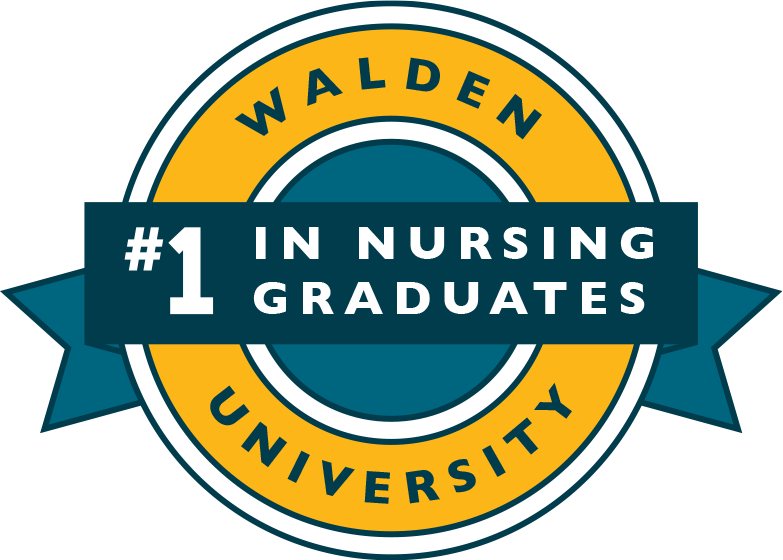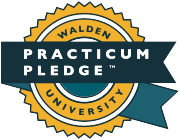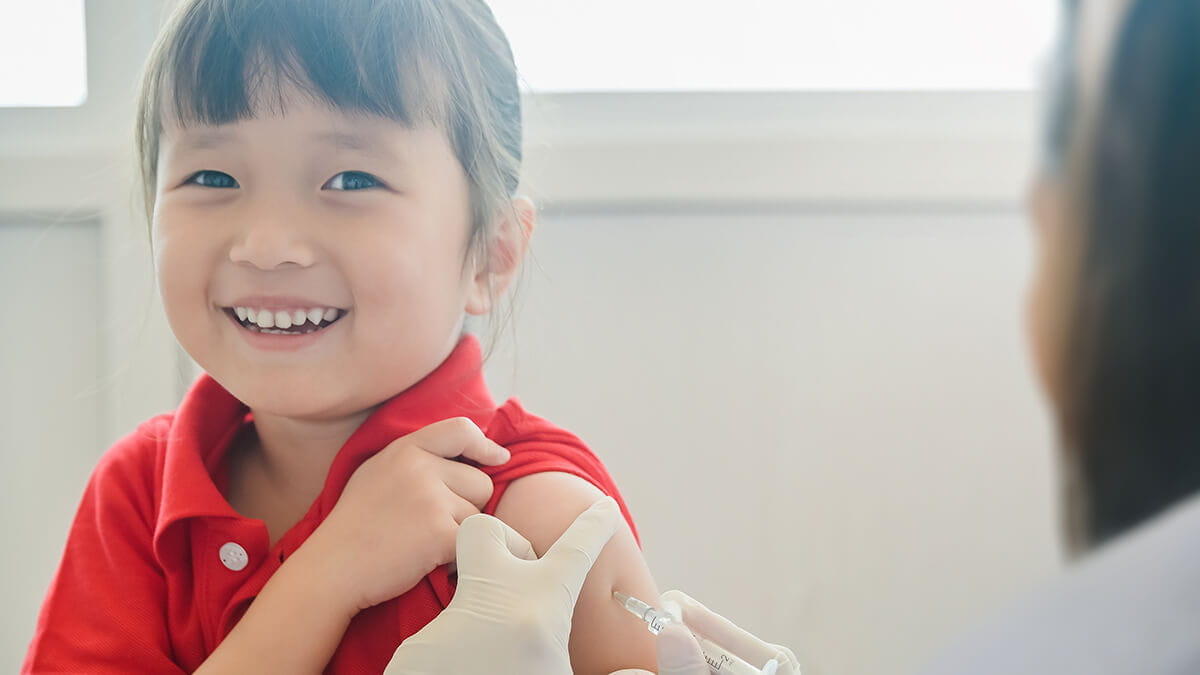Choose the BSN to MSN track if you are a registered nurse (RN) and have already earned your Bachelor of Science in Nursing (BSN) degree.
Curriculum
Degree Completion Requirements
- 63 quarter credits
- Core courses (23 cr.)
- Specialization courses (40 cr.)
Time to completion will vary by student, depending on individual progress and credits transferred, if applicable. For a personalized estimate of the number of your transfer credits that Walden would accept, call an Enrollment Specialist at 844-855-5613.
View the COMPLETE CURRICULUM PLAN
Choose the RN to MSN track if you are a registered nurse (RN) entering the MSN program with a hospital diploma or an associate degree in nursing.
Curriculum
Degree Completion Requirements
- 89 quarter credits
- Foundations courses (26 cr.)
- Core courses (23 cr.)
- Specialization courses (40 cr.)
Time to completion will vary by student, depending on individual progress and credits transferred, if applicable. For a personalized estimate of the number of your transfer credits that Walden would accept, call an Enrollment Specialist at 844-855-5613.
View the COMPLETE CURRICULUM PLAN
If you are a registered nurse (RN) and have earned your bachelor's in nursing degree, you can use these tracks to get started on your doctoral nursing degree.
Add an MBA to our MSN
UNLOCK YOUR BUSINESS POTENTIAL
Gain in-depth insights into nursing leadership and business management with Walden's new, streamlined MSN to MBA path.
- Earn your MSN and then complete your MBA in as few as 12 months.*
- Apply up to three courses from your MSN program to your MBA program.*
Questions? Our Enrollment Specialists are here to give you answers.
*Walden Master of Science in Nursing (MSN) graduates can transfer up to four courses into the Master of Business Administration (MBA) program with a Self-Designed specialization and complete the program in as few as nine months, depending on MSN program specialization . Tuition and time to completion for those with an MSN from another university may vary depending on individual progress and credits transferred, if applicable. Tuition and time to completion may be reduced if transfer credits are accepted, or if you receive grants, scholarships, or other tuition reductions.
Personalized Practicum Support
After you register for the Walden University Practicum Pledge™ (along with other requirements), if you can’t identify a site and preceptor, our dedicated Field Placement Team partners with you to secure your site and preceptor to help you find a match. This enhanced support gives you added confidence as you start your degree journey.
Admission Requirements
Program Admission Considerations (RN-MSN): Registered nurses who hold a hospital diploma, associate degree in nursing, or bachelor’s degree (other than BSN)
Program Admission Considerations (BSN-MSN): A bachelor's degree or higher
General Admission Requirements: Completed online application and transcripts
- The Technical Standards Policy Form, a statement of understanding of the MSN NP practicum requirements.
- Additional Walden admission criteria required. Contact an Enrollment Specialist for more details.
More information for international applicants.
Explore Real-Life Clinical Scenarios With Walden Grand Rounds
As a nurse practitioner student at Walden, you can take part in Walden Grand Rounds several times throughout the quarter. Meet virtually with faculty and classmates to review clinical patient scenarios that are focused on assessing, differentiating, and treating pathological conditions. This is a unique opportunity to connect what you’ve learned in class with real-life situations and challenges you’ll encounter in the field as an NP.
| Curriculum Component | Requirements | Cost | AMOUNT |
|---|---|---|---|
| Tuition | 63 quarter credit hours | $765 per quarter hour | $48,195 |
| Program Fee | Per quarter | $175 | $1,400 |
| Clinical Course Fee | 4 courses (PRAC) | $160 | $640 |
| $50,235* | |||
| BELIEVE & ACHIEVE SCHOLARSHIP YOUR TUITION | -$6,120 $44,115† | ||
*Tuition reflects the minimum time to completion. Time to completion varies by student, depending on individual progress and credits transferred, if applicable. Tuition and time to complete may be reduced if transfer credits are accepted, or if you receive grants, scholarships, or other tuition reductions. Walden may accept up to 30 transfer credits. For a personalized estimate of the number of your transfer credits that Walden would accept, call an Enrollment Specialist at 844-768-0109.
Tuition and fees are subject to change. Books and materials are not included and may cost between $1,500 to $2,000. Students may also incur additional costs related to practicum, including but not limited to costs of travel to their practicum site, practicum onboarding fees, per quarter practicum fees, and liability insurance costs.
† Represents BSN-MSN track, minimum time to completion, and Believe & Achieve Scholarship. Your actual total program time and costs may vary. Believe & Achieve Scholarship savings based on current tuition. See Scholarship Details for more information.
| Curriculum Component | Requirements | Cost | AMOUNT |
|---|---|---|---|
| Tuition | 26 RN Foundational quarter credit hours | $425 per quarter hour | $11,050 |
| 63 MSN quarter credits | $765 per quarter hour | $48,195 | |
| Program Fee | Per quarter | $175 | $1,750 |
| Clinical Course Fee | 4 courses (PRAC) | $160 | $640 |
| $61,635* | |||
| BELIEVE & ACHIEVE SCHOLARSHIP YOUR TUITION | -$6,120 $55,515† | ||
*Tuition reflects the minimum time to completion. Time to completion varies by student, depending on individual progress and credits transferred, if applicable. Tuition and time to complete may be reduced if transfer credits are accepted, or if you receive grants, scholarships, or other tuition reductions. Walden may accept up to 40 transfer credits. For a personalized estimate of the number of your transfer credits that Walden would accept, call an Enrollment Specialist at 844-768-0109.
Tuition and fees are subject to change. Books and materials are not included and may cost between $1,500 to $2,000. Students may also incur additional costs related to practicum, including but not limited to costs of travel to their practicum site, practicum onboarding fees, per quarter practicum fees, and liability insurance costs.
†Represents RN-MSN track, minimum time to completion, and Believe and Achieve Scholarship. Your actual total program time and costs may vary.
Program Outcomes
Build Advanced Clinical Practice Skills
Featuring relatable, multifaceted instruction, our online MSN PNP program is designed to connect directly with your experiences as a nurse. Explore critical topics ranging from growth and development screening and family-centered care to youth mental health. Real-world, practical learning exercises prepare you to provide high-quality, evidence-based care across all pediatric populations.
Walden practicum coordinators are available to assist you in meeting your practicum requirements. View this FAQ document for answers to some of the most common questions about the practicum.
What’s the Career Impact of Earning an MSN Pediatric Nurse Practitioner?
As the country shifts its focus to preventive care, NPs are in demand. Jobs for nurse practitioners as a whole are expected to grow by 45% through 2032 according to the U.S. Bureau of Labor Statistics.1 With an MSN pediatric nurse practitioner (PNP) degree, you’ll be educationally prepared to meet the need for providing healthcare services in pediatrics offices and other primary care settings.
A pediatric nurse practitioner MSN program can empower you to gain clinical autonomy and the reward of overseeing patients of your own. Reach your potential as a nursing changemaker—and help ensure young people get the healthcare they need to reach theirs.
An online pediatric nurse practitioner MSN program can prepare you to work in settings such as:
- Primary care facilities
- School-based settings
- Hospitals
- Pediatric offices
- Specialty clinics
- Urgent care clinics
Career options may require additional experience, training, or other factors beyond the successful completion of this degree program.
Learning Outcomes
As a graduate of this MSN program with a specialization in Pediatric Nurse Practitioner Primary Care, you will:
- Synthesize organizational/systems leadership for cost-effective specialist nursing practice that contributes to high-quality healthcare delivery, advancement of the nursing profession, and social change.
- Critique evidence-based literature drawing from diverse theoretical perspectives and pertinent research to guide decision making that demonstrates best practices for specialist nursing practice in a global society.
- Integratively assess, diagnose, plan, implement, and evaluate cost-effective healthcare strategies that reduce health disparities by patient/population advocacy for access to specialist nursing care.
- Demonstrate the ability to effectively communicate using audience-specific oral, written, and information technology for professional delivery of specialist nursing care.
- Evaluate health needs of diverse populations for necessary teaching/coaching functions based on specialist nursing knowledge to restore/promote health and prevent illness/injury.
- Exhibit ongoing commitment to professional development and value of nursing theories/ethical principles (altruism, autonomy, human dignity, integrity, social justice) in accordance with ethically responsible, legally accountable, specialist nursing practice.
- Implement specialist nursing roles to promote quality improvement of patient-centered care in accordance with professional practice standards that transform health outcomes for diverse populations.
Meet Your MSN PNP Primary Care Academic Team
Testimonials
I chose Walden to earn my advanced degree because I was pleased with the design and presentation of the curriculum, its flexibility, and the very encouraging reviews of the experiences of current students and alumni.
I was very surprised about how well-prepared I felt for my certification boards after graduation. The program prepared me for entry to practice.
Choosing to specialize as a family nurse practitioner has opened many doors. ... I can explore many areas in nursing and still be a nurse practitioner.
Related Articles
Related Programs
FAQ About Walden's Master of Science in Nursing (MSN) Pediatric Nurse Practitioner
In a primary care setting, pediatric nursing refers to clinic-based medical care where a nurse might see a patient, age birth to 21, multiple times over many years and perform care in a number of areas, such as family-centered care, immunization, growth and development screening, and youth mental health intervention. Typically, nurses providing this type of care are trained as primary care pediatric nurse practitioners.
A primary care pediatric nurse practitioner may work in private primary care practices, which in some states can be a practice they own and operate themselves; community pediatric practices; school-based health clinics; health departments; and urgent care clinics or other ambulatory settings.
There are also pediatric nurse practitioners who specialize in acute care of children, including treatment of injury or complex acute and unstable chronic medical conditions. Acute care pediatric nurse practitioners typically practice in hospital settings, such as intensive care units, emergency rooms, sub-specialty clinics and more.
According to the National Association of Pediatric Nurse Practitioners (NAPNAP), these healthcare professionals are “first and foremost, experts in pediatrics and advocates for children.” According to NAPNAP, pediatric nurse practitioners and pediatric-focused APRNs:1
- Treat children from birth through the transition to adult care.
- Practice general pediatrics or specialize in adolescents and young adults or neonatal populations.
- Spend significant time with patients and families, often up to 20 minutes per visit.
- Adhere to each state’s regulatory guidelines for APRN licensure, including practice and prescriptive authority.
- Have full practice and prescriptive authority in 22 states and the District of Columbia that allows them to work independently.2
With a pediatric nurse practitioner primary care master’s degree plus the appropriate certification and state licensure, NAPNAP says you can expect to:1
- Diagnose and treat common childhood illnesses.
- Perform well-child exams and developmental screenings.
- Prescribe medications.
- Screen and manage mental illnesses.
- Manage and help prevent acute, chronic, and critical pediatric diseases.
- Order and interpret results of laboratory and diagnostic tests, X-rays, and ultrasounds.
- Perform school physicals and provide childhood immunizations.
- Advise parents on common child health concerns.
- Provide behavioral counseling to children and caregivers on issues such as improving school performance.
- Work with interprofessional teams to provide evidence-based care for patients with life-threatening illnesses.
- Manage complex and ongoing intensive therapies.
1Source: www.napnap.org/about-pediatric-nurse-practitioners
2Check with your state for updated information on practice and prescriptive authority as information can change.
Step 1: Learn About Certification and Licensure Requirements
Each state has its own requirements, but the majority of states, and many employers, require individuals to be certified by a national certification board. You should complete thorough research of your own state’s requirements, but a master’s-level pediatric nursing education should academically prepare you to sit for the certification exam, which is competency-based and tests clinical knowledge in specific focus areas.
Step 2: Choose the Best University for Your Degree Program
Get started by finding the online nursing program that meets you where you are. Walden University’s online nursing school, for example, gives you a choice of two tracks to earn a Master of Science in Nursing (MSN) with a specialization in Pediatric Nurse Practitioner Primary Care. If you are a registered nurse (RN) with a hospital diploma or an associate degree in nursing, Walden offers an online RN to MSN program. If you are an RN with a Bachelor of Science in Nursing (BSN) degree, you can follow the online BSN to MSN track.
Step 3: Choose the Right Specialization
Next, you’ll want to make sure the online nursing degree program you’re considering offers the pediatric nurse practitioner specialization that fits your career goals. Walden University, for example, offers an MSN program specialization in Pediatric Nurse Practitioner Primary Care. All of Walden’s didactic faculty are doctorally prepared, and clinical faculty either hold doctorates or are APRNs with extensive practice experience.
Step 4: Confirm the Curriculum Standards
As you plan your pediatric nurse practitioner educational journey, you will want the most expert and relevant content and curriculum possible. Find out if the content in the online nursing program you are considering is consistent with the standards of the National Association of Pediatric Nurse Practitioners (NAPNAP) and the National Organization of Nurse Practitioner Faculties (NONPF).
Step 5: Pass Your National Certification Exam
At the completion of your master’s degree, you’ll next need to pass a national Pediatric Nursing Certification exam. With an MSN degree with a PNP specialization from Walden University, you’ll be educationally prepared to sit for this exam.
Step 6: Obtain Your License
As a pediatric nurse practitioner, you may work in a private primary care practice, which in some states can be one you own and operate yourself; a community pediatric practice; a school-based health clinic; a health department; or other ambulatory setting. And according to the U.S. Bureau of Labor Statistics, nurse practitioners can expect an expanding job market through 2029, with employment projected to grow 45%.1
1 Bureau of Labor Statistics | Nurse Anesthetists, Nurse Midwives, and Nurse Practitioners
Walden’s MSN PNP online classrooms feature state-of-the-art learning technologies, media, and support materials. With interactive simulations, engaging case studies, a robust online library, and NP exam prep tests and materials, you will be highly prepared to become an PNP.
Students also benefit from a dedicated support staff—including Student Success Advisors, graduation counselors, and practicum coordinators.
Upon graduation, students in Walden’s online MSN PNP specialization will be academically prepared to sit for the national certification exam. Qualifications to sit for certification exams are determined by the certifying body.
Yes, Walden’s MSN program is accredited by the Commission on Collegiate Nursing Education (CCNE). In fact, three of Walden’s nursing degree programs are CCNE accredited: the Bachelor of Science in Nursing, Master of Science in Nursing (MSN), and Doctor of Nursing Practice (DNP) programs. Officially recognized by the U.S. Secretary of Education, CCNE is an autonomous accrediting agency contributing to the improvement of the public’s health.
No other school in the U.S. graduates more MSN students than Walden. Didactic coursework in the Master of Science in Nursing (MSN) degree program is 100% online, making it possible to earn your degree while you continue to work. Walden does not require travel for health assessments like other universities often do, and students can attend on a part-time or full-time basis. In addition, class sizes are small, and students are taught by 100% doctorally prepared faculty in their didactic courses.
Walden offers exceptional support services that include a robust online library, Student Success Advisors, practicum support staff, career planning and development, and more. Walden is also committed to positive social change, which is emphasized throughout the curriculum.
Yes, this pediatric NP primary care specialization prepares you with the academic requirements to sit for the national Pediatric Nursing Certification Board exam.
The Walden MSN program offers two completion tracks, based on prior education, for students specializing in PNP primary care. Nurses with a BSN will have fewer courses to complete than nurses who have not yet earned a bachelor’s degree.
The BSN to MSN-PNP program track requires 63 quarter credits. Core courses account for 23 credits and the remaining 40 credits are specialization courses.
The RN to MSN-PNP program track requires 79 quarter credits. Nurses will need to complete 29 credits of foundational courses in addition to core courses (20 credits) and specialization courses (30 credits).
Course topics include development and behavior, preventive healthcare, well-child care, and more for patients from birth to 21. In addition, students will also learn the leadership skills they need to manage a healthcare practice, or own and operate their own practice if that option is available in the state in which they plan to provide care.
The time it takes to become a PNP varies by individual and depends on a number of factors. You will first need to obtain an MSN degree with a pediatric NP specialization from a CCNE-accredited program. It’s best to work with an enrollment specialist to understand program completion requirements and potential transfer of credit opportunities. You should also consider how many courses you will take per term. This will depend on your personal preference and the requirements of the university you choose to attend. For example, some universities recommend that students do not take multiple courses during the practicum component of the program to better ensure success.
After you obtain your degree, you will have to pass a national certification examination, which is required in most states for licensure. Many nurses pass on their first attempt; others do not. You will want to choose a university, like Walden, that educationally prepares you to sit for the exam.
Once you are certified, you can apply for licensure in your state.
A nursing practicum gives you valuable practical experience by allowing you to apply your new knowledge and skills in real-life situations and settings. Although you’re responsible for initiating your search for a field site based on your location preferences, Walden offers Practicum Pledge™ that provides Student Success Advisor coaching, resources, and self-help tools you need to identify a practicum site and nursing preceptor that fit with your education and career goals.
With our Practicum Pledge,™ you will benefit from our large network of field sites and preceptors, an additional dedicated Field Placement Team that partners with you to identify a site and preceptor. If you’re unable to identify your own nursing practicum site and preceptor after several attempts, we’ll assist in finding you a suitable match (along with additional requirements*).
1Bureau of Labor Statistics Nurse Anesthetists, Nurse Midwives, and Nurse Practitioners
Commission on Collegiate Nursing Education (CCNE)
The baccalaureate degree program in nursing (BSN), master’s degree program in nursing (MSN), post-graduate APRN certificate program, and Doctor of Nursing Practice (DNP) program at Walden University are accredited by the Commission on Collegiate Nursing Education (www.ccneaccreditation.org).
Note on licensure: Walden’s MSN nurse practitioner specializations are designed to academically prepare graduates with an active registered nurse (RN) license to practice in the U.S. as nurse practitioners. However, each state has its own academic preparation and authority to practice requirements and issues its own license for an RN to be permitted to practice as a nurse practitioner in that state. Learn more about professional licensure.
No graduate program can guarantee that graduates will obtain licensure to practice as a nurse practitioner. We encourage students to consult the appropriate board of nursing or regulatory authority in the states or jurisdictions in which they reside or intend to seek licensure to determine specific requirements. Walden Enrollment Specialists can provide general information relating to licensure; however, it remains the individual’s responsibility to understand, evaluate, and comply with all requirements relating to licensure for the state in which they intend to practice, as requirements vary widely.
Note on certification: Walden’s MSN program is designed to academically prepare graduates to apply for national certification. Walden makes no representations or guarantees that completion of Walden coursework or programs will permit an individual to achieve national certification. We encourage students to consult an appropriate certifying body for the specific certification eligibility requirements. Students should also consult their state board of nursing or other state agency to determine what certifications are required or accepted in that state. It is an individual’s responsibility to understand, evaluate, and comply with all requirements relating to national certification, as requirements vary widely. For more information about nurse practitioner certification exams, students should visit the American Academy of Nurse Practitioners Certification Board at www.aanpcert.org, the American Nurses Credentialing Center at www.nursingworld.org/ancc, the American Association of Critical Care Nurses (AACN) at [email protected], or the Pediatric Nursing Certification Board (PNCB) at https://pncb.org, or other nurse practitioner certification websites.
Enrollment Restrictions by State
Walden currently cannot enroll residents of the following states/districts into any nurse practitioner specializations: Louisiana, New York, Oregon, and Rhode Island. In addition, Walden is not currently enrolling residents from the following states into the MSN PNP specialization: Kentucky, Nevada, and Oklahoma.
Note on Field Experience and Relocating
Students who are considering relocating are advised to contact their Student Success Advisor prior to any decision to relocate in order to determine how relocation may impact progress in their program. Advisors can provide information and guidance on how relocating may result in possible changes, restrictions, and/or additional requirements affecting field experience. Each Board of Nursing and Higher Education Authority governs the field experience rules and regulations in their respective states, and students may be unable to complete field experience in the state in which they plan to relocate. While Walden is committed to working collaboratively with students to secure field sites across the United States, it is imperative that students contact their Student Success Advisor immediately when considering relocating.



















